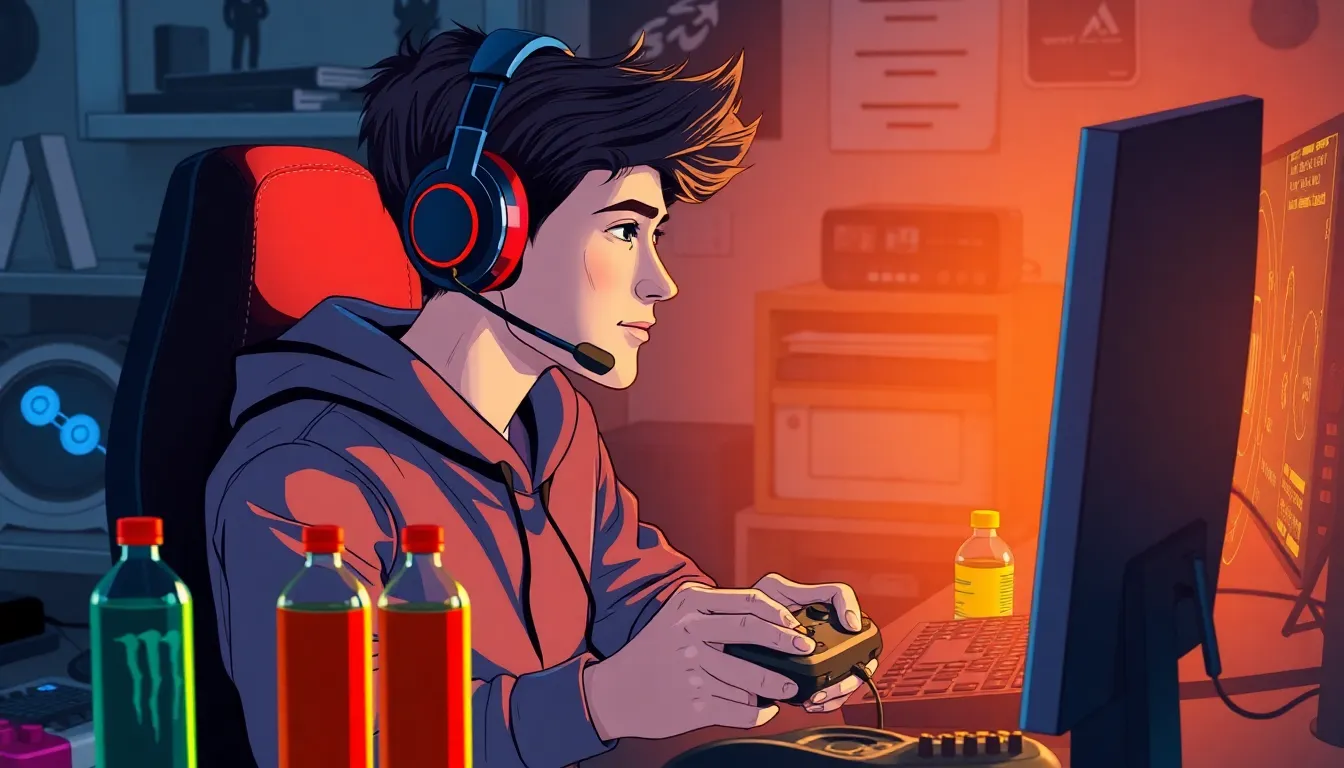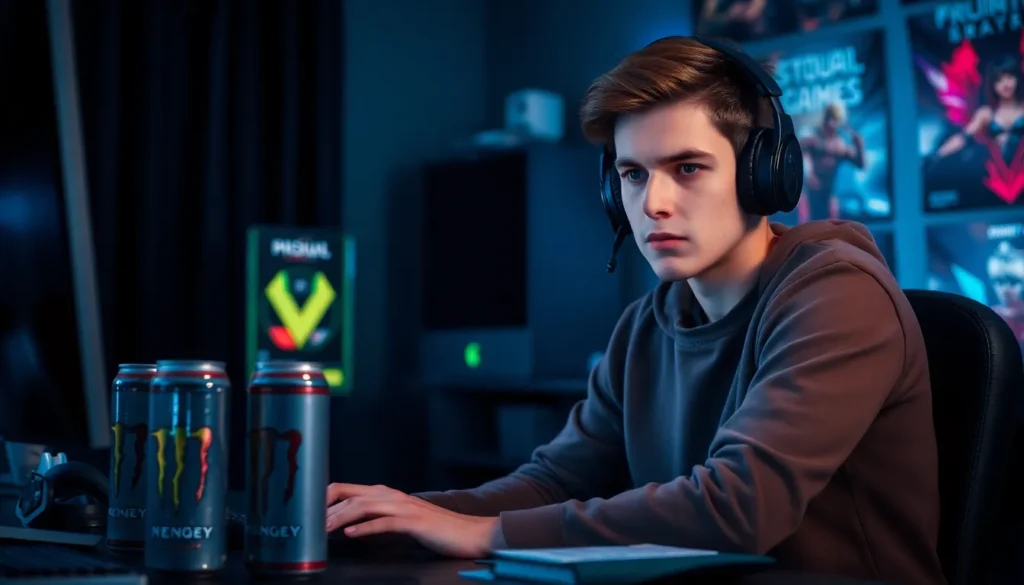In the digital age, gaming’s become as common as binge-watching the latest series. But while slaying dragons and conquering virtual worlds can be thrilling, is there a hidden cost? Many gamers find themselves wondering if their marathon sessions might be more than just a fun escape. Could too much gaming lead to anxiety?
Can Too Much Gaming Overdertoza Cause Anxiety
Overdertoza refers to excessive gaming that disrupts daily life functions. Gamers often experience an overwhelming urge to play, leading to an imbalance in responsibilities and relationships.
Defining Overdertoza
Overdertoza manifests when gaming becomes a primary focus, overshadowing other vital aspects of life. Gamers may prioritize playtime over work, social interactions, or self-care. This behavioral pattern often arises from an addictive intensity toward gaming experiences. Professionals recognize it as a significant concern when gaming turns compulsive, affecting emotional well-being.
Symptoms of Overdertoza
Symptoms of overdertoza vary but commonly include anxiety, irritability, and feelings of isolation. Gamers may also exhibit withdrawal symptoms when not engaged in gameplay. Escaping reality often becomes a crutch, impacting mental health negatively. Loss of interest in previously enjoyed activities suggests a deeper issue. Gamers might neglect basic needs, such as sleep and nutrition, leading to physical health complications.
The Link Between Gaming and Anxiety

Excessive gaming impacts both mental health and daily life. Many gamers experience psychological effects that can lead to anxiety and stress.
Psychological Effects of Excessive Gaming
Prolonged gaming instills feelings of anxiety in many individuals. Changes in mood, irritability, and social withdrawal occur frequently. Gamers may find themselves neglecting real-world relationships, leading to isolation. Increased screen time often correlates with sleep disturbances, which contributes to heightened stress levels. Emotional regulation becomes challenging, and gamers may struggle to cope with everyday pressures. As a result, excessive gaming can undermine overall well-being, creating a cycle of stress and gaming dependency.
How Gaming Triggers Anxiety in Players
Gaming can generate anxiety through various mechanisms. High-stakes scenarios in games often lead to pressure and stress. Players may focus excessively on performance and competition, creating an unhealthy obsession with outcomes. Fear of missing out compounds this anxiety when gamers see peers excelling. Social interactions in online gaming environments may also incite stress due to toxicity and competitiveness. An overwhelming need to engage continuously can lead to feelings of inadequacy, as individuals compare themselves to others. These factors culminate in a significant risk for those who immerse themselves in gaming experiences for extended periods.
Signs That Gaming Is Affecting Mental Health
Excessive gaming can lead to several indicators of deteriorating mental health. Recognizing these signs early aids in addressing potential issues.
Identifying Behavioral Changes
Increased irritability often occurs when gamers face challenges outside their gaming environment. They may isolate themselves from friends and family, preferring virtual interactions. Gamers often display a loss of interest in activities previously enjoyed. Frequent mood swings can emerge due to in-game pressures. Withdrawal from social situations signals deepening engagement with gaming over real-life relationships. Setting aside responsibilities may show a prioritization of game time over essential tasks. These behavioral changes serve as critical markers for assessing mental well-being.
Recognizing Physical Symptoms
Physical symptoms frequently accompany the mental strain of excessive gaming. Fatigue can arise from extended gaming sessions that disrupt sleep patterns. Gamers may also experience headaches tied to prolonged screen time. Poor posture during gameplay leads to discomfort, which can escalate into chronic pain. Weight changes may result from neglecting nutritious meals in favor of snacks while playing. Eye strain develops due to insufficient breaks from screens. Each symptom provides insight into how gaming may impair overall health.
Coping Strategies for Gamers
Implementing coping strategies can significantly benefit gamers dealing with anxiety stemming from excessive gaming. Gamers can prioritize their mental well-being through targeted techniques and practices.
Setting Healthy Boundaries
Establishing healthy boundaries helps gamers maintain a balance between gaming and daily life. Limiting gaming sessions to specific time frames encourages productivity and responsibility. Setting these limits involves creating a gaming schedule that includes breaks and intervals. Evaluating priorities can also assist in recognizing essential tasks outside of gaming. Engaging in non-gaming activities, such as sports or hobbies, fosters well-rounded interests. Regularly reassessing gaming habits provides insight into any necessary adjustments.
Incorporating Mindfulness Techniques
Incorporating mindfulness techniques can effectively reduce anxiety for gamers. Practicing deep breathing exercises before or during gaming sessions promotes relaxation. Mindful gaming involves focusing on the present moment and appreciating the gameplay experience. Engaging in brief meditative sessions before or after gaming allows for mental clarity. Utilizing apps dedicated to mindfulness can make these practices more accessible. Gamers who integrate these techniques into their routine often experience improved emotional resilience. Prioritizing mental health through mindfulness encourages a healthier, more enjoyable gaming experience.
Promote Emotional Resilience
Excessive gaming can lead to significant mental health challenges like anxiety and isolation. As gamers navigate the digital landscape it’s crucial to recognize when their passion for gaming turns into overdertoza. The symptoms can disrupt daily life and strain relationships, making awareness and proactive measures essential.
By setting healthy boundaries and incorporating mindfulness techniques, gamers can mitigate the risks associated with prolonged gaming. Prioritizing well-being over high scores can foster a healthier relationship with gaming and promote emotional resilience. Balancing gaming with real-world interactions can ultimately enhance both mental health and overall quality of life.


